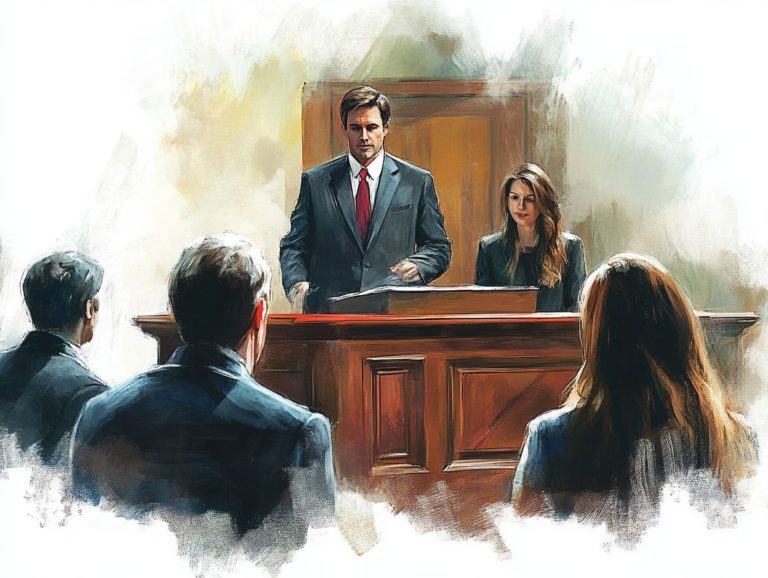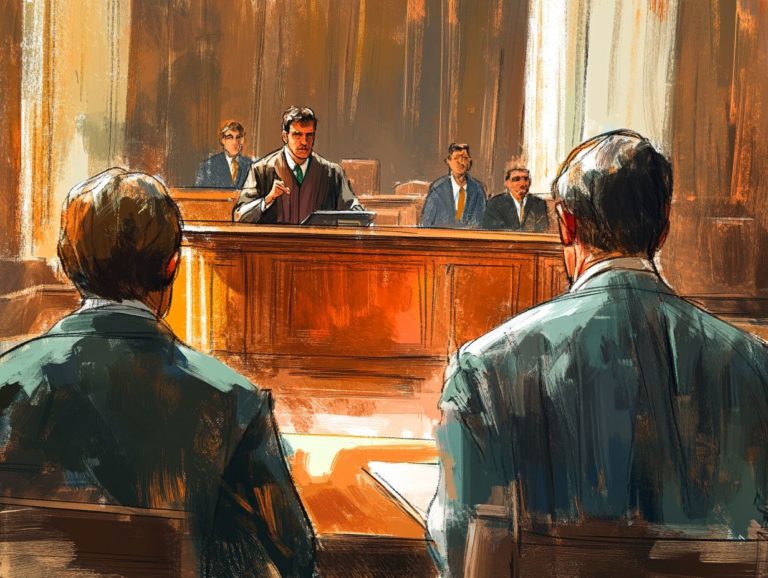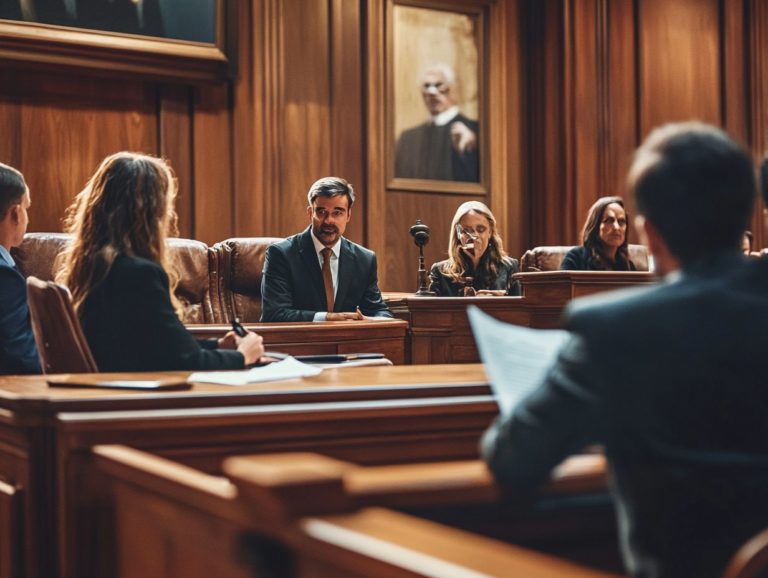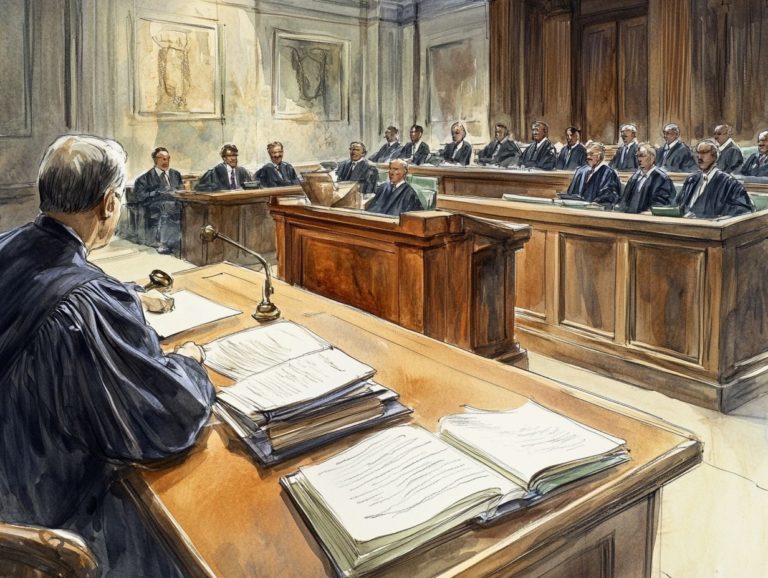The Role of Motive in Defense Strategies
In the complex world of legal defense, understanding the relationship between motive and strategy is essential for readers. This article explores the definition and various types of defense strategies, illustrating how motive influences these approaches.
Readers will explore common defense strategies encountered in court through real-life examples while discussing the challenges in proving motive. You will also learn how to use motive effectively in your defense.
Ethical considerations are important as you navigate the balance between justice and a defendant’s rights. Get ready to discover the vital role that motive plays in crafting a robust defense.
Contents
- Key Takeaways:
- Understanding Defense Strategies
- The Role of Motive in Defense
- Common Defense Strategies Used in Court
- Challenges to Proving Motive in Court
- Effective Use of Motive in Defense
- Ethical Considerations in Using Motive as a Defense
- Frequently Asked Questions
- What is the role of motive in defense strategies?
- Why is motive important in a legal defense?
- Can motive be used as the sole defense in a legal case?
- How can a person’s motive be determined in a legal case?
- Can a strong motive help to strengthen a defense strategy?
- Are there any cases where motive is not relevant in a defense strategy?
Key Takeaways:

- Motive is key to building and executing effective defense strategies!
- Understanding the influence of motive can strengthen a case and improve the chances of a successful defense.
- Ethical considerations must be carefully balanced when using motive as a defense strategy.
Understanding Defense Strategies
Understanding defense strategies in criminal law is crucial for readers, whether they are legal professionals or defendants. These strategies are pivotal in crafting an effective criminal defense and significantly impact trial outcomes.
In the United States, diverse laws and regulations across states, including Florida’s criminal statutes, highlight the need for tailored defense approaches that fit the specifics of each case.
Engaging with legal representation that considers psychological factors and conducts thorough case evaluations is essential for providing a comprehensive understanding of the defense options available while navigating criminal charges.
Definition and Types of Defense Strategies
Defense strategies in criminal law can be categorized into various types, each based on different intent standards and levels of guilt. Understanding these distinctions is crucial for readers to navigate the intricate landscape of criminal defense.
Among these strategies, affirmative defenses, self-defense, and insanity defenses are foundational concepts. Affirmative defenses allow defendants to shift the burden of proof by presenting a justifiable rationale for their actions, while self-defense asserts that one acted to protect themselves from imminent harm.
Insanity defenses examine a defendant’s mental state at the time of the crime, suggesting that they lacked the capacity to comprehend their actions. Intent standards play a pivotal role in these classifications.
Specific intent requires the prosecution to prove that a defendant had a distinct purpose behind their actions, while general intent focuses on the voluntary nature of the act itself. This understanding shapes the courtroom’s perception of guilt and clarifies the nuances of each case.
The Role of Motive in Defense
The role of motive in a defense strategy is paramount, offering valuable insights into the psychological factors driving a defendant’s actions and aiding in establishing their level of guilt.
Understanding a defendant’s motive can be crucial in shaping the outcome of criminal liability. This knowledge can significantly influence jury decision-making throughout trial proceedings, potentially swaying the scales of justice favorably.
How Motive Influences Defense Strategies
The influence of motive on defense strategies is profound, illuminating the reasons behind a defendant’s actions and shaping arguments presented in court. By showcasing compelling evidence of motive, legal representation can effectively argue the defendant’s mental state, a crucial factor in cases involving harmful actions.
For instance, in the high-profile O.J. Simpson trial, attorneys emphasized that the motive stemmed from personal and emotional turmoil. They crafted a psychological narrative designed to resonate with the jury, making the case more relatable.
In another scenario, consider a defendant charged with homicide. Introducing evidence of past abuses can significantly strengthen claims of a diminished mental state, suggesting that the actions were reactions to trauma rather than premeditated.
Establishing a clear motive does more than provide context; it plays a vital role in unraveling the complexities of human behavior, influencing jury perceptions, and ultimately shaping the trial’s outcome.
Dive into the world of defense strategies and empower yourself with the knowledge to navigate legal challenges confidently!
Common Defense Strategies Used in Court

Defense strategies in court depend on the specific criminal charges against defendants. Criminal defense attorneys use various approaches, such as arguing reckless conduct or negligence, to counter the prosecution’s claims.
Examples and Case Studies
Case examples provide valuable insights into successful defense strategies used in court, especially in Florida’s criminal justice system. These studies show the differences between criminal negligence and intentional crime.
Diving into specific cases helps you see how defendants navigate complex legal landscapes. They often leverage the state s unique laws and precedents, such as self-defense claims tied to the Stand Your Ground law.
Trial outcomes affect individual lives and set important precedents for future cases. Analyzing real-life scenarios clarifies Florida criminal law, helping both legal professionals and the public understand their rights.
Challenges to Proving Motive in Court
Proving motive in court is a challenging process. It presents several obstacles, especially with legal analysis and evidence.
These challenges can hinder the prosecution’s ability to show how motive connects to intent. Such complexities can subtly influence jury decisions, impacting the trial’s outcome.
Legal and Evidentiary Issues
Legal and evidentiary issues are critical in trials focused on motive. They dictate what evidence can establish intent and responsibility for a crime.
Understanding these issues is vital for both defense attorneys and prosecutors. The admissibility of evidence, like past convictions or statements from the defendant, can shape jury perceptions.
For instance, rule 404(b) limits using character evidence to prove conduct. This highlights the need to create a compelling narrative of intent while adhering to legal standards.
Effective Use of Motive in Defense
Using motive effectively in defense strategies can sway jury decisions. By establishing a clear motive, you highlight the moral standards guiding the defendant’s actions.
This approach engages jurors emotionally and encourages them to consider the broader context. Doing so can lead to more favorable verdicts.
Strategies for Making a Strong Case

Strategies for making a strong case often hinge on establishing motive, which requires a clear understanding of psychological factors and the broader context of the crime. By fully grasping these elements, you enable defense attorneys to craft compelling arguments that resonate with juries.
Incorporating expert witnesses, such as forensic psychologists and behavioral analysts, can significantly strengthen your defense position. These professionals provide credible insights into the accused’s mental state and motivations. They can offer psychological assessments that explore the defendant s background, shedding light on trauma or stress that may have influenced their actions.
Delving into previously established relationships and relevant incidents can contextualize motives, making them more relatable to jurors.
By weaving these elements into your argument, attorneys not only create a robust narrative but also foster a deeper understanding of human behavior. This ultimately enhances the effectiveness of their defense strategy.
Ethical Considerations in Using Motive as a Defense
Ethical considerations in employing motive as a defense are crucial because they connect to the overall goal of justice and the safeguarding of defendants’ rights.
As you navigate the complexities of legal representation, it s essential to balance these moral standards. This ensures a fair trial process while effectively advocating for your clients best interests.
Balancing Justice and the Defendant’s Rights
Balancing justice and a defendant’s rights is a critical ethical consideration for you as a criminal defense attorney. You strive to uphold the integrity of the legal system while advocating fervently for your clients.
This balance ensures that defendants receive fair representation within the confines of the law. The implications of this delicate equilibrium extend beyond the courtroom, influencing public perception of legal proceedings and shaping future legislation.
You often face challenges where your commitment to justice must coexist with the fundamental rights of those you represent. Each case presents unique circumstances that require you to understand both the moral imperatives and the procedural safeguards designed to protect defendants.
Ultimately, maintaining this balance is vital not only for the individuals involved but also for fostering trust in the wider judicial system.
Frequently Asked Questions
What is the role of motive in defense strategies?
The role of motive in defense strategies is to explain the underlying intention behind a person’s actions. It is crucial in shaping the defense strategy used in a legal case.
Why is motive important in a legal defense?

Motive is important in a legal defense because it helps establish the defendant’s state of mind and intent at the time of the alleged crime. It also provides a potential explanation for their actions.
Can motive be used as the sole defense in a legal case?
No, motive alone cannot serve as the sole defense in a legal case. It must be supported by other evidence and legal arguments to be effective in court.
How can a person’s motive be determined in a legal case?
A person’s motive can be determined through various means, such as witness testimonies, physical evidence, and the defendant’s own statements. It can also be inferred from the circumstances surrounding the alleged crime.
Can a strong motive help to strengthen a defense strategy?
Yes, a strong motive can potentially strengthen a defense strategy by providing a reasonable explanation for the defendant’s actions. It can also help create doubt in the prosecution’s case.
Are there any cases where motive is not relevant in a defense strategy?
Yes, there are certain cases where motive may not be relevant in the defense strategy. For example, in cases of self-defense or mental incapacity, motive may not significantly impact the defense.






